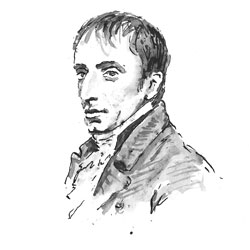William Wordsworth
William Wordsworth was born in 1770. He grew up in the Lake District (with which he is often associated) and went to grammar school at Hawkshead in Furness. His first departure from this part of the country took him to St John's College, Cambridge, in 1787. His Cambridge career was not particularly happy or distinguished, and he graduated without honours in 1791. In 1790 he had undertaken a bold journey through France, in the grip of Revolution, to the Alps. This sparked a fascination with France and radical politics. War between England and France kept him apart from his French mistress, Annette Vallon, and their daughter. Later they agreed to separate and he was married, to Mary Hutchinson, with whom he had five children.
Success and financial security did not come quickly to Wordsworth. However, in 1798 he and his great friend Samuel Taylor Coleridge published the first edition of Lyrical Ballads, and in 1799 he moved back to the Lake District. In 1800 the second edition of Lyrical Ballads came out, this time with its important critical preface (revised and expanded for the 1802 edition) outlining the principles behind the poems and their language. By this time he was also working on The Prelude, the complex autobiographical poem that is usually thought to be his greatest achievement. He worked on this throughout his life, and it was only published in after his death in 1850; most of it was in place by 1805, however. Wordsworth and his family settled at Rydal Mount, overlooking Lake Windermere, but he travelled a good deal in Europe and, as his fame grew, he was feted in London. He became Poet Laureate in 1843.
For the modern reader, there are two key areas of his work to explore: his shorter works, as found in Lyrical Ballads but also in other collections, and The Prelude. The latter includes powerful autobiographical episodes transformed into a profound and searching exploration of the mind, the individual, and poetry in relation to nature and history. While there are various selections of Wordsworth's poetry that include these, it is worth the extra effort to get hold of one through which you can get at the different version ofThe Prelude, such as The Prelude: The Four Texts (1798, 1799, 1805, 1850), ed. Jonathan Wordsworth (London: Penguin, 1995).
The Cambridge Authors pages for Wordsworth include three essays opening up aspects of his work: one looks at two centuries of criticism and interpretation; another looks at how places matter so much in his poetry; and another looks at his experience in Cambridge. We have also included an interview with Cambridge lecturer Dr Stephen Logan, who describes the insights offered by reading Wordsworth aloud, especially in the light of an understanding of the regional dialects of his time.
